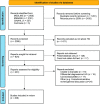Systematic evidence map of evidence addressing the top 10 priority research questions for hyperemesis gravidarum
- PMID: 36691124
- PMCID: PMC9454001
- DOI: 10.1136/bmjopen-2021-052687
Systematic evidence map of evidence addressing the top 10 priority research questions for hyperemesis gravidarum
Abstract
Objective: Knowledge gaps regarding hyperemesis gravidarum (HG) are substantial. We aimed to systematically identify and map recent evidence addressing the top 10 priority questions for HG, as published in 2021 in a James Lind Alliance Priority Setting Partnership.
Design: Systematic evidence map.
Methods: We searched MEDLINE and EMBASE on 12 January 2021 and CINAHL on 22 February 2021 with search terms hyperemesis gravidarum, pernicious vomiting in pregnancy and their synonyms. Results were limited to 2009 onwards. Two reviewers independently screened titles and abstracts to assess whether the studies addressed a top 10 priority questions for HG. Differences were discussed until consensus was reached. Publications were allocated to one or more top 10 research questions. Study design was noted, as was patient or public involvement. Two reviewers extracted data synchronously and both cross-checked 10%. Extracted data were imported into EPPI-Reviewer software to create an evidence map.
Outcome measures: The number and design of studies in the search yield, displayed per the published 10 priority questions.
Results: Searches returned 4338 results for screening; 406 publications were included in the evidence map. 136 publications addressed multiple questions. Numerous studies address the immediate and long-term outcomes or possible markers for HG (question 8 and 9, respectively 164 and 82 studies). Very few studies seek a possible cure for HG (question 1, 8 studies), preventative treatment (question 4, 2 studies) or how to achieve nutritional requirements of pregnancy (question 10, 17 studies). Case reports/series were most numerous with 125 (30.7%) included. Few qualitative studies (9, 2.2%) were identified. 25 (6.1%) systematic reviews addressed eight questions, or aspects of them. 31 (7.6%) studies included patient involvement.
Conclusions: There are significant gaps and overlap in the current HG literature addressing priority questions. Researchers and funders should direct their efforts at addressing the gaps in the top 10 questions.
Keywords: Maternal medicine; OBSTETRICS; Prenatal diagnosis.
© Author(s) (or their employer(s)) 2022. Re-use permitted under CC BY-NC. No commercial re-use. See rights and permissions. Published by BMJ.
Conflict of interest statement
Competing interests: None declared.
Figures



Similar articles
-
A patient-clinician James Lind Alliance partnership to identify research priorities for hyperemesis gravidarum.BMJ Open. 2021 Jan 15;11(1):e041254. doi: 10.1136/bmjopen-2020-041254. BMJ Open. 2021. PMID: 33452191 Free PMC article.
-
What is known about the nutritional intake of women with Hyperemesis Gravidarum?: A scoping review.Eur J Obstet Gynecol Reprod Biol. 2021 Feb;257:76-83. doi: 10.1016/j.ejogrb.2020.12.003. Epub 2020 Dec 10. Eur J Obstet Gynecol Reprod Biol. 2021. PMID: 33360613
-
A core outcome set for hyperemesis gravidarum research: an international consensus study.BJOG. 2020 Jul;127(8):983-992. doi: 10.1111/1471-0528.16172. Epub 2020 Mar 10. BJOG. 2020. PMID: 32056342
-
Hospital admission for hyperemesis gravidarum: a nationwide study of occurrence, reoccurrence and risk factors among 8.2 million pregnancies.Hum Reprod. 2016 Aug;31(8):1675-84. doi: 10.1093/humrep/dew128. Epub 2016 May 31. Hum Reprod. 2016. PMID: 27251205
-
Variation in hyperemesis gravidarum definition and outcome reporting in randomised clinical trials: a systematic review.BJOG. 2018 Nov;125(12):1514-1521. doi: 10.1111/1471-0528.15272. Epub 2018 Jul 2. BJOG. 2018. PMID: 29727913
References
-
- Einarson TR, Piwko C, Koren G. Quantifying the global rates of nausea and vomiting of pregnancy: a meta analysis. J Popul Ther Clin Pharmacol 2013;20:e171–83. - PubMed
-
- Dean C, Bannigan K, Marsden J. Reviewing the effect of hyperemesis gravidarum on women’s lives and mental health. Br J Midwifery 2018;26:109–19.
-
- Royal College of Obstetricians and Gynaecologists . The management of nausea and vomiting of pregnancy and hyperemesis gravidarum. London: Royal College of Obstetricians and Gynaecologists, 2016.
-
- MacGibbon K, Fejzo M, Mullin P. Mortality secondary to hyperemesis gravidarum: a case report. Women’s Health & Gynecology 2015;1. [Online at:http://scientonline.org/open-access/mortality-secondary-to-hyperemesis-g...
MeSH terms
LinkOut - more resources
Full Text Sources
